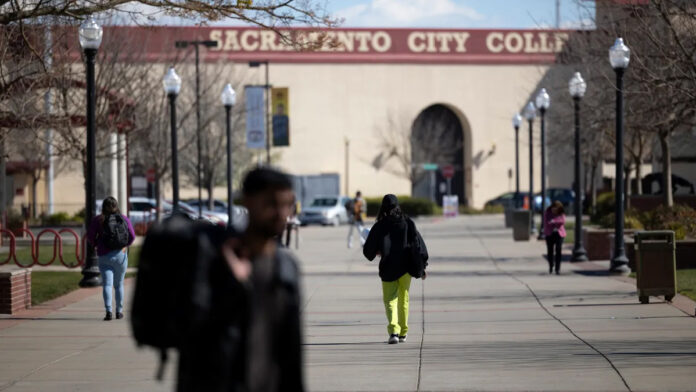The bill, if approved, would begin at UCLA, with other campuses added later. But not everyone is on board with the latest plan
by Mikhail Zinshteyn
CalMatters
It’s rare for a California bill to come back to life after enduring a quiet legislative death, but a shelved effort to help more community college students transfer to the University of California suddenly has new legs.
Spearheading this last-minute revival is bill author Assemblymember Kevin McCarty, a Democrat from Sacramento, who told CalMatters in an interview that his office spent weeks crafting the legislation with representatives from Gov. Gavin Newsom’s office.
McCarty said the proposed law, Assembly Bill 1291, has input from the Senate and Assembly legislative leaders as well. It must pass the Legislature by Sept. 14.
“This is a game changer for higher education access and for expanding enrollment through the community college transfer process,” McCarty said in an interview. “While not perfect, this simplifies more than anything we’ve ever seen.”
He said the bill sets in motion a pathway to achieve a holy grail for higher-education advocates: A common admissions guarantee for community college students to get into a UC or California State University campus. Currently, community college students earning an associate degree for transfer, a specialized associate degree, are guaranteed admission to a Cal State campus — but not one of their choice. No such systemwide guarantee exists for the UC, though select campuses have their own transfer pathways, and the system is working on its own transfer guarantee.
It’s a striking and rapid turn of events for a measure that a Senate committee killed Sept. 1. The original version of this effort, Assembly Bill 1749, also by McCarty, was held by the Senate Appropriations Committee in the semi-annual bill culling called the suspense file. That bill would have created a UC-wide transfer guarantee through the associate degree for transfer and was backed by student groups and the Campaign for College Opportunity, a major player in California higher education advocacy and policy.
The UC system opposed it, arguing that some of its majors have higher academic standards than what’s required to earn the associate degree for transfer. The UC has no position on McCarty’s latest bill, a spokesperson said.
Scholars say California needs to overhaul its process for how students transfer. “Most students who wish to transfer never do, with large variation across racial and ethnic groups,” said a recent report by the Public Policy Institute of California.
McCarty’s bill would create a pilot at UCLA that identifies 12 majors — four in the sciences and math — by 2028 that would be similar to the courses community college students take to earn associate degrees for transfer and that are accepted by Cal States. The pilot would identify eight majors by 2026. The bill also would phase in at least four more UC campuses that would accept 12 majors that are similar to those associate degrees. There’s intent language to have all nine UC campuses that enroll undergraduates take part in the program by 2031-32.
But while McCarty’s original bill included an admission guarantee, this version doesn’t, noted Jessie Ryan, a senior executive at the Campaign for College Opportunity. Instead, the current version says the UC would “prioritize admission” to transferring students.
“We see this new bill as being the baseline and not the ceiling for what we hope will happen with the UC’s commitment to strengthening the transfer pathway,” said Ryan, who added the organization isn’t taking a position on the new bill.
But two students representing University of California and California Community Colleges student governments oppose McCarty’s new bill — and were caught off guard by McCarty’s latest proposal.
“We were definitely not reached out to by the author nor the sponsors for this,” said David Ramirez, government relations director of the UC Student Association and fourth-year student at UCLA.
The new bill is a gut-and-amend, which takes legislation that’s gone through some of the legislative process and completely rewrites it to meet legislative deadlines.
“I’m initially very concerned with what this bill looks like,” Ramirez added. “We certainly won’t be supporting it.” His organization will take a formal position on the bill this evening, he said.
Ramirez wasn’t aware of the bill’s existence until a CalMatters reporter called him for comment yesterday morning.
Chanelle Win, who leads legislative efforts for the Student Senate for California Community Colleges, also said she opposes the bill.
Chiefly, it undermines the goal of having one admissions guarantee for the UC and Cal States by taking a piecemeal approach. She also fears it preempts an existing student and advocacy effort to propose a transfer guarantee to the UC created by a previous state law. Ryan said she doesn’t think the bill upends that effort.
McCarty understands the students’ criticisms, but “like everything else in the legislative process, you have to compromise,” he said.
“I’m not going to let the perfect be the enemy of the good,” he added.
– Mikhail Zinshteyn has been a higher education reporter since 2015. As a freelancer, he contributed to The Atlantic, The Hechinger Report, Inside Higher Ed and The 74.



